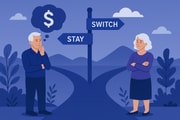New rules for drivers! Fresh fines, slower speeds—starting any day now
By
Maan
- Replies 0
Big changes are on the horizon for drivers across the country, with new rules set to impact everything from speed limits to surveillance measures.
What might seem like routine updates to road safety laws are, in fact, significant shifts that could catch many off guard.
Here's what’s changing from 1 July—and how it could affect your next trip behind the wheel.
Major changes to road rules across Australia were set to take effect from 1 July, with state governments responding to rising road fatalities and risky driver behaviour with new penalties, reduced speed limits, and enhanced surveillance measures.
These high-tech systems were designed to catch drivers in the act—whether they were touching, holding or using their phones, even while stopped at traffic lights.
Offenders faced fines of up to $1209 and the loss of up to five demerit points. But that wasn’t the only surveillance tool being deployed.
New South Wales
In New South Wales, existing mobile phone detection cameras were given a new job—spotting drivers who failed to wear their seatbelts. The change came as part of the state’s effort to tackle one of its deadliest ongoing problems. Between 2019 and 2023, 150 lives were lost in the state due to motorists not wearing a seatbelt.
From 1 July, fines for seatbelt offences increased, and more drivers were expected to be caught thanks to the upgraded technology. Authorities pointed out that, on average, 15 per cent of road deaths in NSW involved a lack of seatbelt use.
NSW also scrapped its ticketless parking fine system, which had been introduced during the pandemic. Many drivers had expressed frustration after receiving fines without any physical notice on their windshields, sparking complaints and confusion.
Victoria
In Victoria, road rule 79A was expanded. From 1 July, drivers had to slow to 40km/h when approaching or passing slow-moving or stationary vehicles—including not just police and emergency vehicles, but also tow trucks and incident response vehicles—if they were displaying flashing red, blue, yellow or magenta lights, or sounding alarms.
Previously, this rule only applied to emergency services. Now, it applied across all road types, including freeways. Those who ignored the rule faced a $346 fine, with the maximum possible fine rising to $961, though no demerit points were attached.
Queensland
Queensland drivers were hit with multiple changes at once. The state announced a 3.4 per cent hike in car registration costs and fines from 1 July, ending a freeze that had originally been scheduled to last until September 2025.
Fines for mobile phone use, speeding and seatbelt offences also increased. In popular tourist areas like Hervey Bay’s Esplanade, speed limits dropped from 50km/h to 40km/h in a bid to improve pedestrian safety.
South Australia
Meanwhile, South Australia introduced a new rule targeting how motorists behaved around roadside and breakdown recovery vehicles. On multi-lane roads, drivers were now required to reduce their speed to 25km/h when passing any vehicle flashing amber lights. Ignoring this rule could result in a fine as high as $1648 and up to seven demerit points.
Importantly, the new rule only applied to vehicles in the same direction of travel. Those on the opposite side of the road weren’t required to slow down.
Western Australia
Speed reductions also swept through parts of Western Australia, where authorities responded to the rising road toll with a significant reset. On sealed roads west of the Bussell Highway, speed limits dropped to 70km/h from the previous 80–100km/h range.
Urban roads weren’t spared either. In areas like Bayview Drive, which led into Gracetown, the speed limit was trimmed from 70km/h to 60km/h. Between Margaret River and Prevelly, limits were slashed from 70–110km/h to just 60km/h. And in Augusta’s town centre, high pedestrian activity prompted a sharp reduction to 40km/h.
The July road rule changes sent a clear message: stricter surveillance, tougher penalties, and slower driving were the new normal for Australians behind the wheel.
It’s tragic reminders like this that show just how quickly things can go wrong on the road—no matter how experienced you are behind the wheel.
If you’ve ever had a close call or worry about others on the road, this is worth watching.
Source: Youtube/9 News Australia

With so many changes hitting the roads next month, do you think these new rules will make driving safer—or just more stressful? Let us know your thoughts in the comments.
In a previous story, we looked at a little-known road rule that could leave drivers with a $600 fine—and many Aussies had no idea they were even breaking it.
For seniors who’ve been driving for decades, it’s a reminder that the road rules aren’t always as clear-cut as they used to be.
If you’re curious about the one mistake catching so many motorists off guard, it’s worth a look.
Read more: Are you accidentally breaking this $600 road rule? Most Aussie drivers have no idea!
What might seem like routine updates to road safety laws are, in fact, significant shifts that could catch many off guard.
Here's what’s changing from 1 July—and how it could affect your next trip behind the wheel.
Major changes to road rules across Australia were set to take effect from 1 July, with state governments responding to rising road fatalities and risky driver behaviour with new penalties, reduced speed limits, and enhanced surveillance measures.
A national rollout of AI-assisted mobile detection cameras marked one of the most significant moves.These high-tech systems were designed to catch drivers in the act—whether they were touching, holding or using their phones, even while stopped at traffic lights.
Offenders faced fines of up to $1209 and the loss of up to five demerit points. But that wasn’t the only surveillance tool being deployed.
New South Wales
In New South Wales, existing mobile phone detection cameras were given a new job—spotting drivers who failed to wear their seatbelts. The change came as part of the state’s effort to tackle one of its deadliest ongoing problems. Between 2019 and 2023, 150 lives were lost in the state due to motorists not wearing a seatbelt.
From 1 July, fines for seatbelt offences increased, and more drivers were expected to be caught thanks to the upgraded technology. Authorities pointed out that, on average, 15 per cent of road deaths in NSW involved a lack of seatbelt use.
NSW also scrapped its ticketless parking fine system, which had been introduced during the pandemic. Many drivers had expressed frustration after receiving fines without any physical notice on their windshields, sparking complaints and confusion.
Victoria
In Victoria, road rule 79A was expanded. From 1 July, drivers had to slow to 40km/h when approaching or passing slow-moving or stationary vehicles—including not just police and emergency vehicles, but also tow trucks and incident response vehicles—if they were displaying flashing red, blue, yellow or magenta lights, or sounding alarms.
Previously, this rule only applied to emergency services. Now, it applied across all road types, including freeways. Those who ignored the rule faced a $346 fine, with the maximum possible fine rising to $961, though no demerit points were attached.
Queensland
Queensland drivers were hit with multiple changes at once. The state announced a 3.4 per cent hike in car registration costs and fines from 1 July, ending a freeze that had originally been scheduled to last until September 2025.
Fines for mobile phone use, speeding and seatbelt offences also increased. In popular tourist areas like Hervey Bay’s Esplanade, speed limits dropped from 50km/h to 40km/h in a bid to improve pedestrian safety.
South Australia
Meanwhile, South Australia introduced a new rule targeting how motorists behaved around roadside and breakdown recovery vehicles. On multi-lane roads, drivers were now required to reduce their speed to 25km/h when passing any vehicle flashing amber lights. Ignoring this rule could result in a fine as high as $1648 and up to seven demerit points.
Importantly, the new rule only applied to vehicles in the same direction of travel. Those on the opposite side of the road weren’t required to slow down.
Western Australia
Speed reductions also swept through parts of Western Australia, where authorities responded to the rising road toll with a significant reset. On sealed roads west of the Bussell Highway, speed limits dropped to 70km/h from the previous 80–100km/h range.
Urban roads weren’t spared either. In areas like Bayview Drive, which led into Gracetown, the speed limit was trimmed from 70km/h to 60km/h. Between Margaret River and Prevelly, limits were slashed from 70–110km/h to just 60km/h. And in Augusta’s town centre, high pedestrian activity prompted a sharp reduction to 40km/h.
The July road rule changes sent a clear message: stricter surveillance, tougher penalties, and slower driving were the new normal for Australians behind the wheel.
It’s tragic reminders like this that show just how quickly things can go wrong on the road—no matter how experienced you are behind the wheel.
If you’ve ever had a close call or worry about others on the road, this is worth watching.
Source: Youtube/9 News Australia
Key Takeaways
- AI-powered cameras were introduced nationwide to catch drivers using phones or not wearing seatbelts.
- NSW increased penalties for seatbelt offences and scrapped ticketless parking fines.
- Victoria, SA, and WA introduced or expanded rules lowering speed limits near emergency or slow vehicles.
- Queensland raised registration fees and fines, and cut speed limits in popular tourist zones.
With so many changes hitting the roads next month, do you think these new rules will make driving safer—or just more stressful? Let us know your thoughts in the comments.
In a previous story, we looked at a little-known road rule that could leave drivers with a $600 fine—and many Aussies had no idea they were even breaking it.
For seniors who’ve been driving for decades, it’s a reminder that the road rules aren’t always as clear-cut as they used to be.
If you’re curious about the one mistake catching so many motorists off guard, it’s worth a look.
Read more: Are you accidentally breaking this $600 road rule? Most Aussie drivers have no idea!








